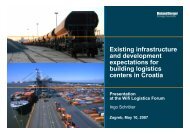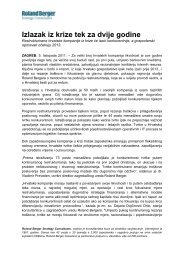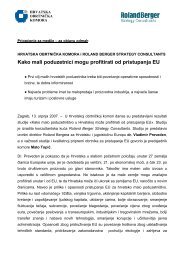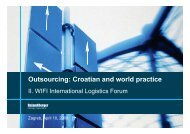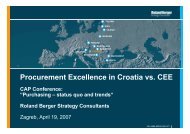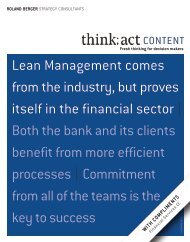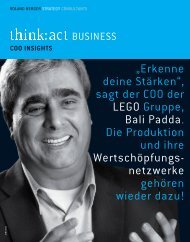COO Insights "Growth through transformation" - Roland Berger
COO Insights "Growth through transformation" - Roland Berger
COO Insights "Growth through transformation" - Roland Berger
You also want an ePaper? Increase the reach of your titles
YUMPU automatically turns print PDFs into web optimized ePapers that Google loves.
Managing complexity<br />
Carve-outs are a mammoth<br />
task for management.<br />
The complexity of the<br />
divestment is just one<br />
part of the challenge; the<br />
other is communication.<br />
HERE ARE THE MOST COMMON TRAPS THAT<br />
FIRMS MUST WATCH OUT FOR:<br />
1. The carve-out is not planned from beginning to end<br />
Corporate structures often seem set in stone. Parts of the business<br />
are perceived as non-strategic but, at the same time, nondivestible<br />
– areas that the fi rm cannot easily dispose of for antitrust<br />
reasons, say. Often the fi rm fails to draw up a systematic carve-out<br />
program.<br />
Spinning off one area of business may not be enough: It could<br />
be that several areas need to go. This was the case with Bayer/<br />
Lanxess: fi rst the subsidiary became fully independent, then it<br />
spun off certain of its own divisions, such as textile chemicals.<br />
2. The carve-out is delayed<br />
The decision-makers in M&As often try to drag out the process. If<br />
they receive a good offer for the part of the company that is up for<br />
sale, they hold out for an even better one. If they only receive offers<br />
below the asking price, they abandon the sale altogether. Firms<br />
often fail to recognize that the entity offered for sale must be<br />
attractive for the buyer long term, and at least self-supporting. The<br />
timing of mergers or acquisitions – making the right decision at<br />
the right time – plays a major role in carve-outs.<br />
3. The focus is solely on financial aspects<br />
Investment bankers and auditors play an essential role in<br />
acquisitions. Their advice is vital – and comes with a hefty price<br />
tag attached. Financial and operational due diligence are<br />
considered something of a silver bullet in the acquisition process.<br />
Yet there is disagreement about the contribution made by<br />
fi nancial advisors when it comes to spin-offs.<br />
The reason is not hard to fi nd. The operational aspects of<br />
the carve-out are often left to the auditors and their transaction<br />
teams, whose assessments skirt over strategic aspects such as<br />
sustainable growth and operational effi ciency.<br />
<strong>COO</strong> <strong>Insights</strong> | 01.2013<br />
27




